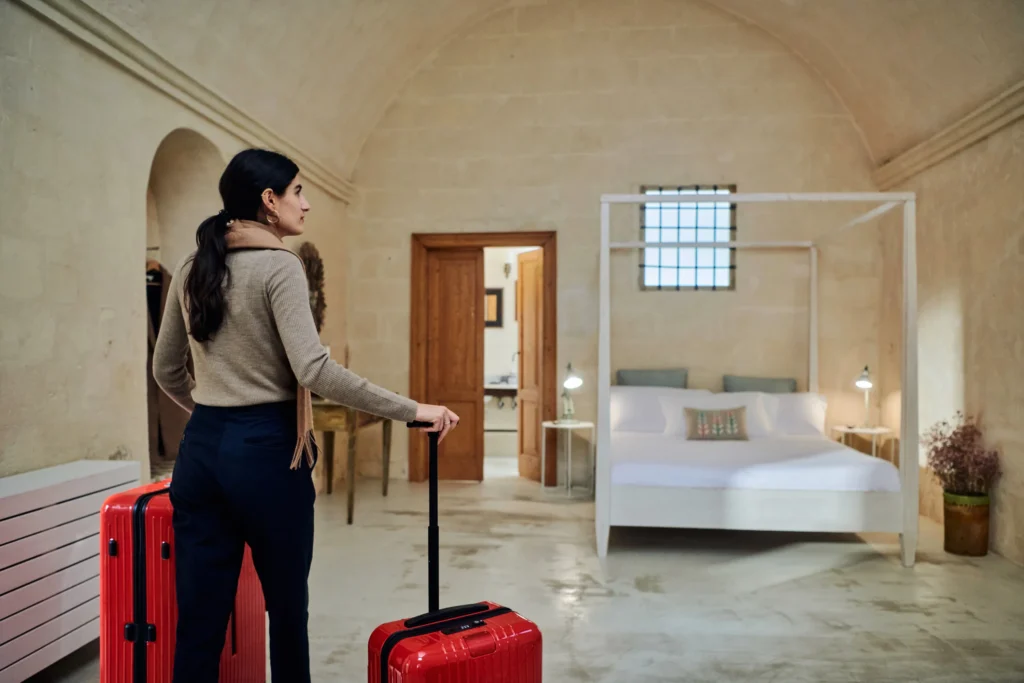When setting up an Airbnb, one of the most overlooked yet critical decisions is determining your property’s guest capacity. It’s not just about how many people your property can physically accommodate—it’s about understanding the powerful role guest count plays in shaping your market position, driving bookings, and maximizing profitability.
Guest count influences how travelers perceive value, how they compare your property to other options, and whether they see your listing as the perfect choice for their needs. Whether you’re hosting a couple on a romantic getaway or a group of 20 celebrating a milestone event, the capacity of your property directly affects your ability to meet guest expectations and generate revenue.
This isn’t simply about bigger is better. Each guest capacity tier—from small retreats to large group homes—brings unique advantages and challenges, and understanding these dynamics is key to setting your property apart. Let’s explore why guest count matters and how tailoring your property to different group sizes can create exceptional value for your guests while boosting your bottom line.
1. Guest Count Shapes Your Market Position
Your property’s guest capacity determines its appeal and competitive edge in the short-term rental market. It defines the type of travelers you attract, how they evaluate value, and why they choose your listing over others. Let’s break it down by capacity tiers to understand how guest count can position your property for success.
Small Capacity (1-2 Guests)
Small-capacity properties typically attract solo travelers, couples, or business professionals. These properties are in direct competition with hotels and motels, which offer similar accommodations, often with fewer amenities and less flexibility. However, Airbnb properties offer a more personalized, home-like experience that many guests prefer.
- Lower Maintenance: Small properties generally require less time and effort to maintain and clean, making them cost-effective and easier to manage.
- Higher Occupancy Nights: Due to their broad appeal, small-capacity properties often attract a high number of short-term, frequent bookings.
- Value for Money: Solo travelers or couples booking a small Airbnb often find better value compared to a hotel room, especially when you factor in the added comfort of kitchen access, private space, and unique features not available in traditional accommodations.
- Direct Hotel Competition: Hotels and motels are direct competition here, often offering rooms for couples, solo travelers or business guests. However, your Airbnb can provide a more personalized experience, with extra features like a full kitchen, larger living spaces, and private amenities that hotels can’t offer.
Medium Capacity (3-6 Guests)
Medium-sized properties are ideal for small families, friend groups, or work colleagues traveling together. Compared to hotels and motels, these properties offer more space and greater value for groups.
- Lower Maintenance: Cleaning and upkeep costs are typically manageable compared to larger properties.
- Higher Occupancy Nights: Medium-capacity homes appeal to a broad demographic, which leads to frequent turnover and consistent bookings.
- Direct Hotel Competition: Hotels and motels are direct competition here, often offering rooms for small groups or families. However, your Airbnb can provide a more personalized experience, with extra features like a full kitchen, larger living spaces, and private amenities that hotels can’t offer.
Medium-sized properties also offer a great balance of space and affordability, which is appealing to guests who want to stay together in a more comfortable, cost-effective environment.
Now You’re Not Competing Against Hotels Anymore
As soon as you move into the 7-12 guest capacity range, your property is no longer in direct competition with hotels or motels. Instead, you’re entering a different market segment—one where guests are looking for an experience and value that traditional accommodations simply cannot provide.
- The Shift in Market Focus: At this stage, your property is designed to cater to larger groups—family reunions, corporate retreats, multi-generational vacations, or group celebrations. Guests are no longer comparing your listing to a single hotel room, but rather the cost of booking multiple rooms for their group.
- The Need for Space and Privacy: Hotels and motels typically offer a one-size-fits-all experience—rooms that, while functional, don’t provide the privacy and space large groups need. In contrast, your property offers a whole home with multiple bedrooms, communal areas, and private amenities that allow guests to stay together under one roof, fostering a sense of connection and comfort that hotels can’t replicate.
- Guests Are Seeking Unique Experiences: When booking larger accommodations, guests are often looking for features that make the experience memorable, such as a private pool, game rooms, spacious dining areas, or event spaces for special celebrations. Hotels don’t usually offer these unique amenities, and your property can stand out by providing experiences tailored to large groups.
If you’re wondering how your design choices could be limiting your short-term rental bookings, it’s worth reviewing whether your space truly caters to the needs and expectations of larger groups. This guide breaks down how design impacts guest experience and bookings.
At this point, you’ve moved from providing just a place to sleep to offering a destination that can host a variety of activities and create lasting memories for your guests.
Large Capacity (7-12 Guests)
Properties that accommodate 7-12 guests are perfect for mid-sized family gatherings, group vacations, or work retreats. When you get to this size, you begin to see a significant shift in value perception compared to traditional hotels and motels. A group of 10, for example, may find your listing a far better value than booking 5 hotel rooms at a comparable price.
- Shared Cost Advantage: Splitting a $600 nightly rate between 10 guests brings the price down to just $60 per person. When guests compare this to hotel rates, the value of booking a large, private home becomes immediately clear.
- Higher Occupancy Nights: Large-capacity homes have the potential for longer stays and more consistent bookings from large families, corporate groups, or special occasion celebrations.
- Flexibility for Smaller Groups: A property that accommodates 10 can also work for 7 or 8 guests, offering extra space for comfort and less crowded living arrangements.
When you get into this tier, guests often value the experience of staying together in a spacious home with the luxury of extra rooms and private amenities.
Extra-Large Capacity (13-16+ Guests)
Once you get to properties that accommodate 13 or more guests, that’s where the real value begins to show. Guests in this category are often booking for large family reunions, milestone celebrations, or destination events. These properties are designed for guests who want to enjoy an event or vacation together, which is where the real competitive advantage over hotels, motels, and smaller vacation homes lies.
- Shared Cost Advantage: With 16 guests splitting a $1,000 nightly rate, it brings the cost down to just $62.50 per person. When compared to booking multiple hotel rooms, this is a significant savings for large groups.
- Higher Occupancy Nights: Large-capacity homes often attract long-term bookings for events, retreats, or family gatherings, making them highly profitable over extended periods.
- More Space, More Comfort: Extra-large properties typically offer expansive spaces such as commercial-grade kitchens, sprawling living areas, and large outdoor spaces perfect for entertaining.
When you cater to these larger groups, your property becomes a destination in itself. With the right amenities, such as private game rooms, firepits, BBQ areas, and other group-friendly features, you’ll stand out in a market that’s underserved for larger accommodations.
The Power of Shared Costs and Group Dynamics
At every guest capacity level, the ability to share costs among a group enhances the perceived value of your property. For example:
- A $400/night Airbnb for 8 guests averages just $50 per person, far cheaper than individual hotel rooms.
- Guests gain more than just savings—they also benefit from shared experiences, such as dining together, relaxing in a private space, or enjoying outdoor entertainment.
This is especially impactful for larger properties. Guests are comparing the cost of booking an entire home versus multiple individual rooms in a hotel or motel. The larger the property, the greater the savings—and the more appealing it becomes for groups of all sizes.
Property Highlights: What Does Your Property Offer for Large Groups?
Once you’ve determined the optimal guest count for your property, it’s essential to showcase what your home has to offer for larger groups. For example:
- Firepits or Outdoor Spaces: Large gatherings often look for spaces where they can come together outside. A firepit or BBQ area creates an inviting atmosphere for evening relaxation.
- Game Rooms and Entertainment Zones: Whether it’s a home theater, pool table, or video games, these areas are a hit for group stays.
- Spacious Dining Areas: Larger groups will appreciate ample dining space where they can enjoy meals together. This is a major selling point compared to motels or hotels, which often don’t offer this level of flexibility.
You should also emphasize the value of staying together as a group under one roof. Multiple rooms and shared spaces allow guests to have privacy but still enjoy communal time in a way that traditional hotels or motels cannot provide.
Tailoring Your Property for Different Guest Counts
Understanding how guest count impacts your pricing strategy, marketing, and the overall guest experience is crucial. Here are some practical tips for tailoring your property:
- Charge for the Space, Not Per Guest: Instead of pricing by the number of guests, charge for the space as a whole. A larger property provides additional space and comfort, which can be highly appealing to groups.
- What Does Your Property Offer for Large Groups? Highlight the amenities that make your space ideal for group stays—whether it’s multiple bathrooms, a large dining area, or an outdoor BBQ.
- Market the Right Way: Emphasize how your property offers a unique experience for larger groups—whether it’s more space, better amenities, or a better overall value compared to booking multiple hotel rooms. When you position your property correctly and focus on the benefits for large groups, you tap into a market that is actively looking for solutions that accommodate their needs while providing an unforgettable experience.
If you’re still comparing your Airbnb to nearby listings and adjusting based on what others are doing, it may be holding you back. Here’s why comparing your Airbnb to your neighbors is hurting your bookings.
Maximizing Your Property’s Potential
To get the most out of your property’s guest capacity, it’s essential to make strategic decisions about how to market it. When you’re catering to larger groups, ensure your property is optimized to accommodate those needs:
- Clear Communication of Amenities: Highlight all of the key features that make your property ideal for large groups, such as spacious dining areas, ample bathrooms, entertainment options, and outdoor spaces. Let potential guests know exactly what they can expect.
- Highlight Flexibility: Make sure to emphasize that your property is versatile. A property that sleeps 16 is perfect for smaller groups as well, providing ample space for everyone to relax comfortably without feeling crowded.
- Showcase the Group Experience: Capture the essence of group gatherings in your listing photos and descriptions. Show images of large groups enjoying your space together, whether it’s around a dining table, having fun in the game room, or sitting around a firepit. This helps potential guests imagine themselves in your property.
The bottom line is that the more people your property can accommodate, the more opportunities you have to create memorable experiences, and the more competitive your property becomes in the growing short-term rental market.
Final Thoughts
Understanding how guest count affects your Airbnb setup is essential to creating a profitable, high-demand property. By considering how many guests you can host and tailoring your property’s features to suit larger groups, you can position yourself well above traditional hotel competition.
As you expand into larger properties, you create new value for your guests by offering more space, shared costs, and amenities that allow them to enjoy their stay together, creating lasting memories and a great return on investment for you.
Are you ready to maximize your Airbnb potential by leveraging guest count? Focus on the experience your property offers, from the number of guests it can accommodate to the unique amenities that make it stand out. Your guests will appreciate the value and comfort, and your bottom line will thank you for it.




